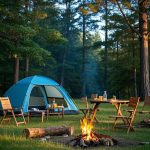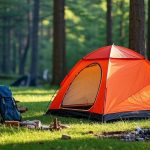Discover 11 solo camping tips for safe, confident adventures—gear, safety strategies & advice from an experienced camper.
Solo camping can feel intimidating at first—even overwhelming. It’s not uncommon for new solo campers to hesitate at the trailhead, second-guessing their decision. But with the right knowledge and preparation, solo adventures can be both safe and deeply rewarding. These solo camping tips are designed to help beginners build confidence, develop essential skills, and enjoy the wilderness on their own terms.

Table of Contents
1. Tell Someone Your Exact Plans (And Stick to Them)
This one may seem obvious, but it’s often overlooked. Failing to communicate your plans can trigger unnecessary search efforts. Always let someone reliable know your exact itinerary, expected return time, and check-in schedule—especially if you’re camping solo in remote areas without cell service. Even a short delay can cause concern if no one is aware of your change in plans.
Always leave a detailed itinerary with someone trustworthy. Include your exact campsite location, backup campsites, planned hiking routes, and expected return time. Use GPS coordinates —not just “somewhere near Bear Lake.” Give them your vehicle description and license plate too. Set specific check-in times and actually follow through.

Text them your emergency contact every evening around 7 PM, even if it’s just “All good, beautiful sunset tonight.” If something changes, communicate immediately.
2. Master Your Gear Before You Go
Nothing’s worse than struggling with unfamiliar equipment in the dark while you’re alone. You don’t want to spent forty minutes trying to set up a new tent in the rain because you’d never practiced with it. Practice setting up your entire camp in your backyard multiple times. Time yourself doing it in daylight, then try it again with just a headlamp. This includes your tent, sleeping system, camp stove, water filtration, and any other critical gear.

Know how to troubleshoot common problems. What happens if your tent zipper breaks? How do you fix a torn sleeping pad? You can carry duct tape and safety pins for quick repairs, plus backup options for essential items like lighting and fire starting.
These solo camping tips emphasize preparation and practice—two things that make a huge difference when you’re on your own. The more familiar you are with your gear and potential issues, the more confidently you’ll handle challenges in the backcountry.
3. Choose Beginner-Friendly Locations First


Your first solo trip shouldn’t be a remote wilderness expedition. Start with established campgrounds that had other campers nearby but weren’t crowded. State parks with good cell coverage are perfect for building confidence. Following these solo camping tips for beginners helps reduce anxiety and builds skills gradually.
Look for locations with potable water, restroom facilities, and camp hosts if you’re nervous. These amenities reduce risk and let you focus on getting comfortable with the solo camping experience rather than survival skills. Recreation.gov is perfect for finding and booking established campgrounds with these features.
Research the area thoroughly beforehand. Read recent trip reports, check weather patterns, and understand local wildlife behavior. Use apps like AllTrails and Campendium to read real camper reviews before choosing any new spot. These solo camping tips help you make informed decisions and avoid unexpected surprises on the trail.
4. Pack Smart Safety Equipment
Your safety kit should include more than just a first aid kit. Carry a satellite communicator like a Garmin inReach Mini, which lets you send messages and call for help even without cell service. It’s worth every penny for peace of mind. These essential solo camping tips for safety equipment can literally save your life in remote locations.

Multi-tool, emergency whistle, flashlight plus backup headlamp, fire starter, emergency shelter, and extra batteries are non-negotiables. Also, pack a small mirror for signaling and paracord for various emergency uses.
Avoid overpacking by choosing versatile camping gear that serves multiple functions. For example, a quality sleeping pad can double as a seat, trekking poles can support a tarp shelter, and a simple bandana offers dozens of practical uses. Smart packing makes solo camping more efficient and enjoyable.
5. Trust Your Gut About Locations and People
Trust your instincts when choosing a campsite—if something feels off about the location or the people nearby, don’t ignore it. Safety is critical, especially when camping solo. Uncomfortable gut feelings can be early warnings of real dangers, such as recent break-ins or unsafe conditions. For more ways to stay secure outdoors, check out our essential camping safety tips.
Scout your campsite during daylight if possible. Look for good visibility, multiple exit routes, and natural barriers like rocks or trees that provide some privacy. Avoid spots too close to main roads where people might easily wander over. When interacting with other campers, be friendly but don’t overshare details about your solo status or plans.

Most people are genuinely nice, but there’s no need to advertise that you’re alone or exactly where you’ll be. Smart solo camping tips like this help maintain your privacy and security while still being social.
6. Perfect Your Campfire Management Skills
Fire safety is especially critical when solo camping—there’s no backup if something goes wrong. Even a small mistake, like unattended embers on a windy day, can escalate into a serious wildfire risk. Practicing proper fire management techniques is essential for any solo camper.

Always clear a 10-foot radius around your fire pit, keep water or dirt nearby for extinguishing, and never leave a fire unattended even for a minute.Build smaller fires that are easier to control rather than impressive blazes.
Proper fire extinguishing is a vital solo camping safety skill. Always stir the ashes, douse them with water, and stir again until no heat remains. A cold fire pit ensures you’re leaving no risk of flare-ups behind. The Leave No Trace principles provide excellent guidelines for responsible campfire practices that every solo camper should follow.
7. Develop Confident Food Storage Practices
Wildlife encounters can pose a serious challenge during solo camping trips, especially when food isn’t stored correctly. While bears get most of the attention, smaller animals like raccoons are more likely to invade campsites and damage gear or steal supplies. Following proper solo camping food storage tips—such as using bear-proof containers or hanging food away from camp—helps prevent these common issues and keeps your campsite safe.
In bear country, proper food storage is non-negotiable. Use approved bear canisters or hang your food at least 12 feet off the ground and 4 feet away from tree trunks. Carrying lightweight rope and practicing the food hang technique in advance is a smart move for any solo camper aiming to prevent unwanted wildlife encounters.

Cook and eat away from your sleeping area whenever possible. Set up a kitchen area at least 100 yards from your tent and store all scented items there—toothpaste, deodorant, soap, everything. Even gum wrappers can attract animals.
8. Plan Your Solo Hiking Strategy
Hiking alone from a campsite requires extra caution. It’s important to stick to well-marked trails and turn back if conditions worsen. Since no one else is there to track your movements, getting lost or injured can quickly become serious. These essential solo camping safety tips can help prevent emergencies and ensure a safer hiking experience.
Start hikes early in the day to allow plenty of daylight for unexpected delays. Aiming to return to camp by late afternoon—around 4 PM—provides a buffer to handle any issues before nightfall. Leave clear signs at your campsite indicating which direction you went and when you left.

You can use rocks or sticks to create an arrow pointing toward your hiking route and leave a note with your expected return time.
9. Master Weather Awareness and Preparation
Weather can have a major impact on solo camping, and being prepared is essential. An unexpected storm or poorly chosen campsite can quickly lead to unsafe conditions. Checking detailed forecasts and selecting well-drained, sheltered locations are key steps. When you’re alone, weather-related camping tips become especially important for staying safe and making smart decisions under pressure.
Check weather multiple times before your trip and understand local patterns. Mountain weather changes fast, desert temperatures swing dramatically, and coastal areas can get unexpectedly windy. Have contingency plans for severe weather.

Know where the nearest shelter is, pack extra layers even in summer, and don’t be afraid to cut your trip short if conditions become dangerous. Pride isn’t worth hypothermia or getting struck by lightning.
10. Build Mental Resilience for Solo Nights
The mental aspect of solo camping can catch many people off guard. That first night alone in the wilderness often feels overwhelming, with every sound seeming louder and more ominous. It’s normal to feel anxious, especially for beginners. Mental preparation tips for solo camping can help ease those fears, build confidence, and make the experience more enjoyable.
Bringing activities for the quiet evening hours can help keep your mind engaged and ease any nighttime anxiety. A book, journal, or simple game provides a healthy distraction and prevents your imagination from fixating on every sound in the forest. Practice relaxation techniques before your trip.

Deep breathing, progressive muscle relaxation, or meditation can help manage anxiety when you’re feeling isolated or nervous about unusual sounds.
11. Know When to Call It and Head Home
Knowing when to end a trip early is an important part of solo camping safety. In some situations—such as equipment failure, sudden weather changes, illness, or an uneasy feeling—packing up and leaving is the smartest and safest decision you can make.
Set clear criteria for when you’ll abandon the trip. If your shelter fails, if you feel sick, if weather becomes dangerous, or if you’re just not enjoying yourself—there’s no shame in heading home early. Every solo camping experience offers valuable lessons, even when things don’t go as planned.

A miscommunication with family can highlight the importance of sharing your itinerary, while a rainy tent mishap might lead to better gear preparation in the future. Each trip helps build skills and confidence for the next adventure.
Solo camping can lead to some of the most peaceful and empowering experiences in the outdoors. Starting small, being well-prepared, and gradually taking on more challenging trips helps build both confidence and self-reliance. These comprehensive solo camping tips are designed to support a safe, skillful progression—so you can enjoy the unique freedom and fulfillment that comes with exploring the wilderness alone.
Conclusion: Your Solo Adventure Awaits
It’s remarkable how much can change between a camper’s first anxious night alone and the confidence gained through experience. What may begin with uncertainty can grow into some of the most meaningful and rewarding outdoor moments. The quiet beauty of dawn over a remote mountain lake—experienced in complete solitude—is a kind of peace that’s hard to find anywhere else.
The truth is, solo camping isn’t about proving you’re tough or fearless. It’s about discovering what you’re capable of when it’s just you and nature. Every successful solo trip builds confidence that carries over into other areas of life. You learn to trust your instincts, solve problems independently, and find peace in your own company.
Don’t let fear keep you from trying something that could change your perspective on the outdoors entirely. Start with a single night at a nearby state park. Pack your gear, follow these safety guidelines, and see how it feels. You might surprise yourself with how much you enjoy the freedom and self-reliance that comes with camping alone.
Remember, every experienced solo camper was once exactly where you are now—curious but cautious, excited but nervous. The difference is they took that first step. Your solo camping journey starts with proper preparation, smart decision-making, and the courage to head out there and try it. The wilderness is waiting, and you’re more ready than you think.







